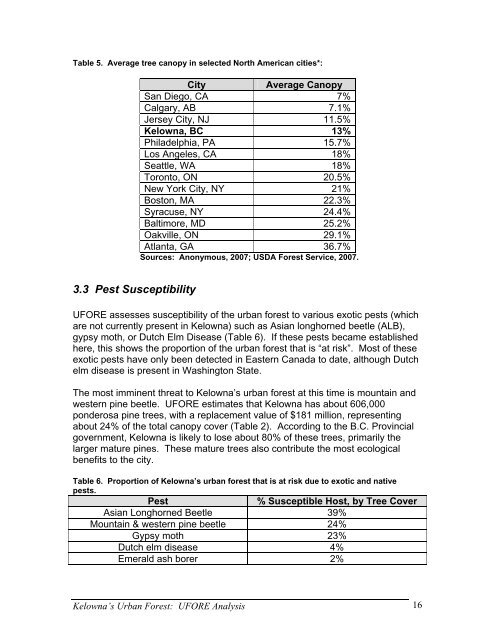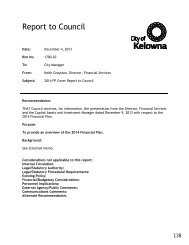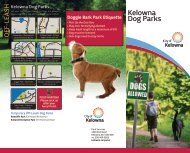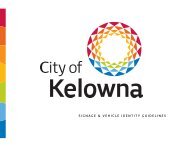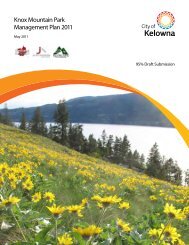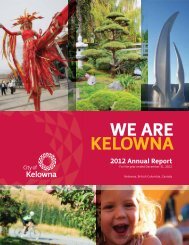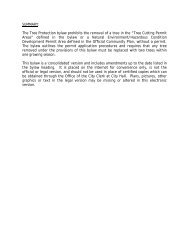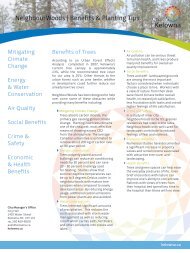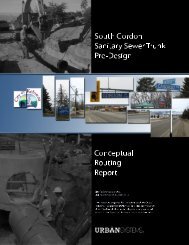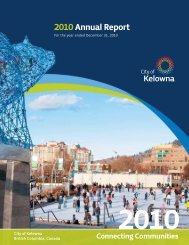Kelowna's Urban Forest: - City of Kelowna
Kelowna's Urban Forest: - City of Kelowna
Kelowna's Urban Forest: - City of Kelowna
Create successful ePaper yourself
Turn your PDF publications into a flip-book with our unique Google optimized e-Paper software.
Table 5. Average tree canopy in selected North American cities*:<br />
<strong>City</strong><br />
Average Canopy<br />
San Diego, CA 7%<br />
Calgary, AB 7.1%<br />
Jersey <strong>City</strong>, NJ 11.5%<br />
<strong>Kelowna</strong>, BC 13%<br />
Philadelphia, PA 15.7%<br />
Los Angeles, CA 18%<br />
Seattle, WA 18%<br />
Toronto, ON 20.5%<br />
New York <strong>City</strong>, NY 21%<br />
Boston, MA 22.3%<br />
Syracuse, NY 24.4%<br />
Baltimore, MD 25.2%<br />
Oakville, ON 29.1%<br />
Atlanta, GA 36.7%<br />
Sources: Anonymous, 2007; USDA <strong>Forest</strong> Service, 2007.<br />
3.3 Pest Susceptibility<br />
UFORE assesses susceptibility <strong>of</strong> the urban forest to various exotic pests (which<br />
are not currently present in <strong>Kelowna</strong>) such as Asian longhorned beetle (ALB),<br />
gypsy moth, or Dutch Elm Disease (Table 6). If these pests became established<br />
here, this shows the proportion <strong>of</strong> the urban forest that is “at risk”. Most <strong>of</strong> these<br />
exotic pests have only been detected in Eastern Canada to date, although Dutch<br />
elm disease is present in Washington State.<br />
The most imminent threat to <strong>Kelowna</strong>’s urban forest at this time is mountain and<br />
western pine beetle. UFORE estimates that <strong>Kelowna</strong> has about 606,000<br />
ponderosa pine trees, with a replacement value <strong>of</strong> $181 million, representing<br />
about 24% <strong>of</strong> the total canopy cover (Table 2). According to the B.C. Provincial<br />
government, <strong>Kelowna</strong> is likely to lose about 80% <strong>of</strong> these trees, primarily the<br />
larger mature pines. These mature trees also contribute the most ecological<br />
benefits to the city.<br />
Table 6. Proportion <strong>of</strong> <strong>Kelowna</strong>’s urban forest that is at risk due to exotic and native<br />
pests.<br />
Pest<br />
% Susceptible Host, by Tree Cover<br />
Asian Longhorned Beetle 39%<br />
Mountain & western pine beetle 24%<br />
Gypsy moth 23%<br />
Dutch elm disease 4%<br />
Emerald ash borer 2%<br />
<strong>Kelowna</strong>’s <strong>Urban</strong> <strong>Forest</strong>: UFORE Analysis 16


